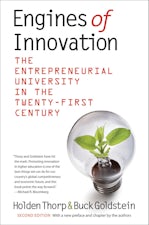Research to Revenue
A Practical Guide to University Start-Ups
By Don Rose, Cam Patterson
Foreword by Herbert W. Boyer, cofounder of Genentech
352 pp., 6.125 x 9.25, 16 figs., 30 tables, appends., notes, index
-
Paperback ISBN: 978-1-4696-7677-7
Published: January 2023 -
E-book EPUB ISBN: 978-1-4696-2527-0
Published: January 2016 -
E-book PDF ISBN: 979-8-8908-4863-5
Published: January 2016
Luther H. Hodges Jr. and Luther H. Hodges Sr. Series on Business, Entrepreneurship, and Public Policy
Buy this Book
- Paperback $29.95
- E-Book $19.99
About the Authors
Don Rose is currently a Venture Partner with Hatteras Venture Partners, an early-stage life science investment firm, as well as an entrepreneur-in-residence with Alexandria's Research Triangle Launch Labs.
For more information about Don Rose, visit
the
Author
Page.
Cam Patterson serves as chancellor of the University of Arkansas for Medical Sciences.
For more information about Cam Patterson, visit
the
Author
Page.
Reviews
“Explore[s] the unique facets of university entrepreneurship, from recognizing when theoretical research can result in practical products to managing conflicts of interest between faculty and administrations. A complex and timely topic.” —BizEd
“A solid introduction to the process of commercializing laboratory-discovered innovations through the startup approach.”—Science
"Well-crafted, readable, and quite interesting, this practical primer will guide university inventor-entrepreneurs in navigating the start-up process from disclosure through firm formation and fund raising."--Martin Kenney, University of California, Davis
"Using applicable real-world examples, Don Rose and Cam Patterson elucidate the mechanics of transitioning from academic to applied research. Research to Revenue provides a broad view of the entire enterprise, from initial concepts through successful exits." —Michael Kinch, Washington University in St. Louis
"In Research to Revenue, Rose and Patterson shed light on how universities secure, protect, and commercialize intellectual property, with a heavy emphasis on the start-up approach. Nowhere else is there such a comprehensive practical guide to university start-ups." —David Allen, Tech Launch Arizona
“Don Rose and Cam Patterson have crafted a clear, useful, thorough, readable, objective, and realistic guide to commercializing university research, especially via start-up companies. It’s a must-read for technology transfer professionals, entrepreneurial faculty members, research administrators, early-stage venture investors, and others involved in this complex but important process. Perhaps more importantly, as a 28-year practitioner of university technology transfer and commercialization, I highly recommend that university presidents, boards of trustees, and government policy makers focused on innovation-based economic development read this book.”—Mark Crowell, Vice President, Innovation and Economic Development, King Abdullah University of Science and Technology, and past president, Association of University Technology Managers (AUTM)


